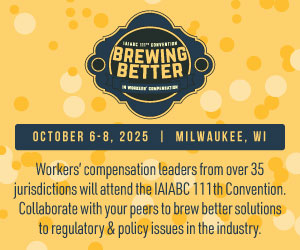Industry Insights
February 3, 2021
Insisoulath: Interpreter Fees: Market Rate vs. Fee Schedule
- State: California
- - 1 share
Workers’ compensation defendants regularly deal with disputes in regard to interpreter fees, particularly as to whether they are entitled to the market rate or the fee schedule.

Julie Insisoulath
One would assume that since there is a fee schedule in place, an interpreter’s rate is not rebuttable. However, the California Code of Regulations seems to provide a loophole.
Per C.C.R. §9795.3:
- For an appeals board hearing, arbitration or deposition: Interpreter fees shall be billed and paid at the greater of the following (i) at the rate for one-half day or one full day as set forth in the Superior Court fee schedule for interpreters in the county where the service was provided, or (ii) at the market rate. The interpreter shall establish the market rate for the interpreter's services by submitting documentation to the claims administrator, including a list of recent similar services performed and the amounts paid for those services. Services over eight hours shall be paid at the rate of one-eighth the full day rate for each hour of service over eight hours.
- For all other events listed under subdivision (a), interpreter fees shall be billed and paid at the rate of $11.25 per quarter hour or portion thereof, with a minimum payment of two hours, or the market rate, whichever is greater. The interpreter shall establish the market rate for the interpreter's services by submitting documentation to the claims administrator, including a list of recent similar services performed and the amounts paid for those services.
Even though the regulations seem to allow for a higher rate for interpreters, there are many other arguments that can be made to minimize, if not completely eliminate, some of the interpreter’s billings.
Requirement to submit for second review
Most recently, in Meadowbrook Insurance Co. v. WCAB, a California appeals court ruled that claims administrator Meadowbrook Insurance was not required to pay a disputed fee for interpreter services because the interpreter failed to submit a second review appeal before filing a lien.
Meadowbrook argued that California Labor Code Section 4603.2, which states that if the only dispute is the amount of the payment, and the provider does not request a second review within 90 days, the bill shall be deemed satisfied and neither the employer nor the employee shall be liable for any further payment.
A provider cannot resubmit the bill to the administrator, nor can it make a written demand alone for the remaining payment and later argue that those requests should be construed as requests for second review. C.C.R. § 9792.5.5 has specific requirements, as well as a specific form, DWC Form SBR-1, that must be submitted along with the request.
The submission for second review is mandatory. If this step is skipped, a provider could risk waiving all rights to recovery for the disputed amount.
Establishing market rate
In the en banc decision of Guitron v. Santa Fe Extruder, the appeals board determined that although an employer is required to pay for an interpreter at medical treatment appointments, the interpreter has the burden of proving entitlement to the fees billed. To recover charges for interpreter services, the interpreter lien claimant bears the burden to prove that:
- The services provided were reasonably required.
- The services were actually provided.
- The interpreter was qualified to provide the services.
- The fees charged were reasonable.
C.C.R. §9795.3 provides that the interpreter shall establish the market rate for the services by submitting documentation to the claims administrator, including a list of recent similar services performed and the amounts paid. This could be submitted in the form of prior payment made by other carriers. If these documents are not produced, the interpreter would not be able to carry the burden to prove its case for a higher market rate.
Requirement to provide certified interpreters
Another argument a claims administrator could make against a higher interpreter rate and the billing altogether is to argue that the appearing interpreter was not certified. While a claims administrator/employer is required to pay for interpreting services to alleviate communication barriers, Labor Code Section 4600(g) states that an employer shall not be required to pay for the services of an interpreter who is not certified or is provisionally certified by the person conducting the medical treatment or examination, unless the administrator/employer consents in advance.
In other words, if the interpreter does not meet the necessary certifications, the bills could be denied payment in their entirety. Thus, claims administrators should make it a habit to regularly check the certification numbers of the appearing interpreters.
Conclusion
It is worth noting that while one can make the aforementioned arguments, proceeding to trial on these issues does carry some notable risk. After all, there is not much case law on this issue, which could make trial results more unpredictable. And the longer the issue is litigated and the longer the balance remains unpaid, daily interest accrues on each of the date(s) of service until the outstanding amount is paid.
With that in mind, we recommend that you carefully choose which interpreter fee disputes you intend to push to trial.
Julie Insisoulath is an associate attorney at Bradford & Barthel’s Oakland location. This entry from Bradford & Barthel's blog appears with permission.
Advertisements
Columns
- Kamin: Subpoenaed Records That Can Help With Internal, Psych Claims 08/27/25
- Peabody: Request for Remote Testimony Can Satisfy WCAB Rules With Due Process at Stake 08/25/25
- Montgomery: New DOL Billing Requirements 08/22/25
- CAAA: State Extends Safety Protections to Domestic Service Workers 08/20/25
- Zachry: A Leader in the Fight Against Opioid Abuse 08/18/25
- Kamin: Asking About Liens Against Compensation 08/15/25
- Snyder: Examine Your Process 08/14/25
- Paduda: California Comp Drivers, Part 2 08/13/25
- CAAA: DWC Fumbles UR Rulemaking 08/12/25
- Paduda: California Comp Drivers, Part 1 08/11/25
- Langham: Bias Is Pernicious 08/08/25
- CAAA: Workers Can't Wait for Heat Protection 08/06/25
- Montgomery: State's Mandatory E-Billing Process Arrives 08/04/25
- CAAA: Audit Exposes Deep Failures at Cal/OSHA 07/30/25
- Paduda: Work Comp Remains the Darling of P&C Industry 07/28/25
- Wroten: The Flip Side of Regulations 07/25/25
- Moore: Were We Right About Comp in 2022? 07/23/25
- Kamin: WCIRB Says Carriers Losing Money Due to Rising Costs 07/21/25
- Paduda: What's Happening in Golden State Work Comp? 07/18/25
- CAAA: Fireworks Warehouse Blast Exposes Flaws in Safety, Oversight, Accountability 07/16/25
Now Trending
- Workers' Compensation News
-
Calif. Deadline
for Recon Doesn't Implicate
Fundamental Jurisdiction, Is
Subject…
Posted on Aug 21, 2025James Witkop says: “Leave it to the 6th, which never grants writs, to get involved…”
-
Calif. Committee
Passes Uninsured Employer, Death
Benefit…
Posted on Aug 22, 2025
-
Calif. Amendment
Would Limit Expansion of Heart
Trouble…
Posted on Aug 28, 2025
-
Calif. DWC
Proposes MTUS…
Posted on Aug 26, 2025
-
Calif. Bill to
Allow Review for Contract Disputes
Heads to Senate…
Posted on Aug 21, 2025
-
Wash. Report:
Computer System Upgrade Suspended
for Lack of…
Posted on Aug 28, 2025
-
Calif. Senate
Passes Bill to Extend SCIF
Investment…
Posted on Aug 27, 2025
-
Texas DWC Proposes
Amendments to SIB Rules…
Posted on Aug 27, 2025
-
N.J. Governor
Signs Bill to Require Coverage for…
Posted on Aug 26, 2025
-
Ohio Supreme Court
Reinstates Denial of Worker's
Request for PTD…
Posted on Aug 28, 2025
Jobs
- Senior Attorney/Assistant Attorney 1/2/3 (NY HELPS) WCB Item #8000
- Legal Secretary/Receptionist
- WC Defense Attorney 1+ year experience - Nor Cal - Fully Remote
- Now Hiring - Workers Compensation Defense Attorney
- Administrative Assistant II
- Workers Compensation Defense Attorney: Remote or Hybrid
- WC Defense Attorney Workers' Compensation Jobs
Upcoming Events
Sep 2-4, 2025
San Diego Elevate Workers' Com
We are thrilled to announce that Early Bird registration is OPEN for ELEVATE® 2025! This year's …
Nov 7, 2025
WIMAH 2025 Workers’ Compensati
Join Hawai'i’s premier workers’ comp event for expert insights, top-tier networking, and standout …
Social Media Links
c/o Business Insurance Holdings, Inc.
Greenwich, CT 06836




No Comments
Log in to post a comment